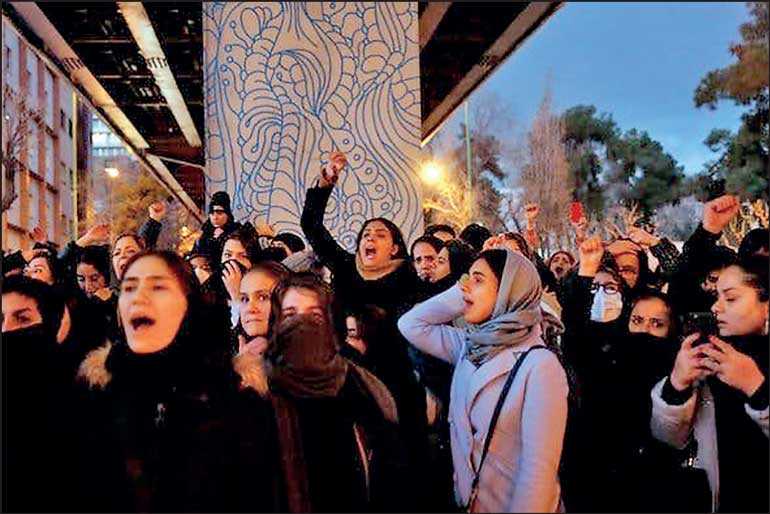Tuesday Feb 17, 2026
Tuesday Feb 17, 2026
Tuesday, 14 January 2020 00:00 - - {{hitsCtrl.values.hits}}

DUBAI (Reuters): Protesters denouncing Iran’s clerical rulers took to the streets and riot police deployed to face them on Monday, in a third day of demonstrations after authorities acknowledged shooting down a passenger plane by accident.
Demonstrations at home — some apparently met by a violent crackdown — have become the latest consequence of one of the most de-stabilising escalations between the United States and Iran since the Iranian revolution of 1979.
Video from inside Iran showed students on Monday chanting slogans including “Clerics get lost!” outside universities in the city of Isfahan and in Tehran, where riot police were filmed taking up positions on the streets of the capital.
Images emerged from the previous two days of protests showing wounded people being carried and pools of blood on the ground, while the sound of gunfire could be heard.
Authorities denied that police had opened fire. U.S. President Donald Trump, who raised the stakes last week by ordering the killing of Iran’s most powerful military commander, tweeted to Iran’s leaders: “Don’t kill your protesters.” Tehran has acknowledged shooting down the Ukrainian jetliner by mistake on Wednesday, killing 176 people, hours after it had fired at US targets in Iraq to retaliate for the killing of General Qassem Soleimani in a drone strike in Baghdad.
Iranian public anger, rumbling for days as Iran repeatedly denied it was to blame for the plane crash, erupted into protests on Saturday when the military admitted its role.
Scores, possibly hundreds, of protesters were videoed at several sites in Tehran and Isfahan, a major city south of the capital. “They killed our elites and replaced them with clerics,” demonstrators chanted at a protest outside a university in Tehran on Monday, referring to Iranian students returning to studies in Canada who were among those killed on the flight. Videos posted late on Sunday recorded gunshots in the vicinity of protests in Tehran’s Azadi Square. Wounded were being carried and security personnel could be seen running with rifles. Other posts showed riot police hitting protesters with batons as people nearby shouted “Don’t beat them!”
“Death to the dictator,” footage circulating on social media showed protesters shouting, directing their fury directly at Ayatollah Ali Khamenei, Iran’s supreme leader since 1989.
Reuters could not independently authenticate the footage. State-affiliated media reported the protests on Saturday and Sunday in Tehran and other cities, without giving such details.
“At protests, police absolutely did not shoot because the capital’s police officers have been given orders to show restraint,” Hossein Rahimi, head of the Tehran police, said in a statement carried by the state broadcaster’s website. Tehran’s showdown with Washington has come at a precarious time for the authorities in Iran and the proxy forces they support to wield influence across the Middle East. Sanctions imposed by Trump have caused deep harm to the Iranian economy.
Iranian authorities killed hundreds of protesters in November in what appears to have been the bloodiest crackdown on anti-government unrest since the 1979 revolution. In Iraq and Lebanon, governments that have the support of Iran-backed armed groups have also faced months of hostile mass demonstrations.
Trump wrote on Twitter late on Sunday that National Security Adviser Robert O’Brien had “suggested today that sanctions and protests have Iran ‘choked off’, will force them to negotiate.”
“Actually, I couldn’t care less if they negotiate. Will be totally up to them but, no nuclear weapons and ‘don’t kill your protesters’,” he wrote, repeating his earlier tweets making similar calls to the Iranian authorities not to open fire. Iran’s Government spokesman dismissed Trump’s comments, saying Iranians were suffering because of his actions and they would remember that he had ordered the killing of Soleimani, whose death on 3 January prompted days of mourning ceremonies.
Trump precipitated escalation with Iran since 2018 by pulling out of a deal between Tehran and world powers under which sanctions were eased in return for Iran curbing its nuclear program. Trump has said his goal is to force Iran to agree to a more stringent pact.
Iran has repeatedly said it will not negotiate as long as US sanctions are in place. It denies seeking nuclear arms.
The recent flare-up began in December when rockets fired at US bases in Iraq killed a US contractor. Washington blamed pro-Iran militia and launched air strikes that killed at least 25 fighters. After the militia surrounded the US embassy in Baghdad for two days, Trump ordered the strike on Soleimani, known as the architect of Iran’s network of regional proxies.
Iran retaliated on Wednesday by firing missiles at Iraqi bases where US troops were stationed, but did not kill any Americans. The Ukrainian plane, on its way to Kiev, crashed hours later. Most of those killed were Iranians or Iranian dual nationals. Scores were Canadians, most believed to be dual nationals who had travelled to Iran to visit relatives there.
After days of denying responsibility, commanders of Iran’s Revolutionary Guards issued profuse apologies. Iran’s president called it a “disastrous mistake”. A top commander said he had told the authorities on the day of the crash it had been shot down, raising questions about why Iran had initially denied it.